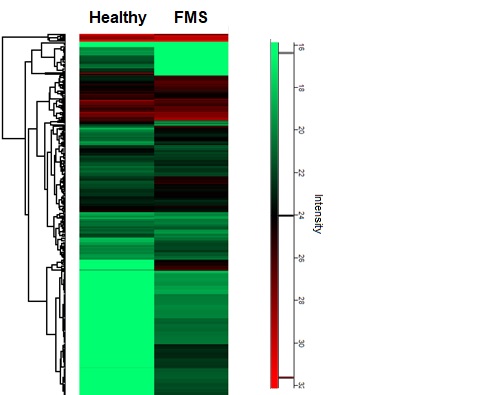Session Information
Date: Tuesday, November 14, 2023
Title: (1827–1839) Fibromyalgia & Other Clinical Pain Syndromes Poster
Session Type: Poster Session C
Session Time: 9:00AM-11:00AM
Background/Purpose: The Fibromyalgia syndrome (FMS) is a global chronic pain condition, which affects approximately 2–6% of the population. The underlying mechanism of FMS is unclear and there is no specific lab test to confirm the diagnosis of FMS. There is an unmet need regarding the development of a precise diagnostic marker for FMS. Previous studies had demonstrated that small extracellular vesicles (sEVs), are involved in: intercellular communications and in the pathogenesis of inflammatory/autoimmune diseases. Recently, an autoimmune origin had been suggested for the development of FMS. In the current study, we aimed to characterize sEVs derived from blood of FMS patients and to explore a potential change in the expression of key proteins in these vesicles as compared to healthy controls.
Methods: sEVs have been isolated from the plasma of women diagnosed with primary FMS (n=9) vs. Age matched healthy women (n=9), using size exclusion chromatography technique. Characterization of these sEVs have been conducted using nanoparticle tracking analysis, transition electron microscopy and western blot analysis. The protein profile of these sEVs have been explored using proteomics analysis.
Results: We found changes in the expression of various proteins in sEVs derived from plasma of FMS as compared to healthy controls (Figure 1), among them: immunological- (e.g. Complement component 1q), neurological- (e.g. Cofilin-1), ribosomal protein assembly- (e.g. Nucleophosmin) and oxidative stress- (e.g. Superoxide dismutase) related proteins.
Conclusion: Our results potentially shed a light on the importance of sEVs in the pathophysiology of FMS and their potential to serve as a new diagnostic biomarker candidate in FMS.
To cite this abstract in AMA style:
Halpert G, Yechiali D, Katbi l, Govrin E, Guilbord B, Segal O, AMITAL H. Blood-derived Extracellular Vesicles as Potential Diagnostic Biomarker in Fibromyalgia Syndrome [abstract]. Arthritis Rheumatol. 2023; 75 (suppl 9). https://acrabstracts.org/abstract/blood-derived-extracellular-vesicles-as-potential-diagnostic-biomarker-in-fibromyalgia-syndrome/. Accessed .« Back to ACR Convergence 2023
ACR Meeting Abstracts - https://acrabstracts.org/abstract/blood-derived-extracellular-vesicles-as-potential-diagnostic-biomarker-in-fibromyalgia-syndrome/

